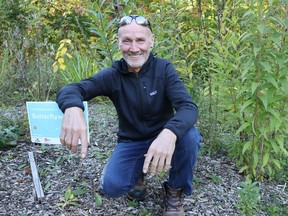Interest is growing in planting native species in Sarnia-Lambton to help biodiversity, says a retired landscape designer helping co-ordinate projects.

Interest is growing in planting native species in Sarnia-Lambton to help biodiversity, says a retired landscape designer helping co-ordinate projects.
Advertisement 2
Article content
“My goal is to get more stuff in the ground,” said Mike Smalls. “And if I can contribute the knowledge that I have and the energy that I have, I’ll run with this as long as it’s got some legs.”
Article content
Eight planting projects alone are set for early May at local schools, with school board and sponsorship money, and aid from the local Golden K Kiwanis club, he said.
“There’s a number of things that are happening,” Smalls said.
Mini-forests are being planted at five schools, he said.
The idea of planting tightly packed upper, mid and lower-storey trees, so they grow and compete with each other to create a thickness in as little as eight or 10 years, is fairly new in Sarnia, he said.
Smalls worked with Kiwanis builders clubs at Queen Elizabeth II and London Road elementary schools last year to establish first-stage mini-forests.
Advertisement 3
Article content
More plantings are planned at those schools this year to expand those projects, and Sarnia’s Lansdowne and High Park schools and Camlachie’s Errol Village school, will start their own in May, he said.
“It’s an easy-embrace project by the schools,” he said. “And Golden K Kiwanis. . . are all over it with funding.”
The projects are relatively inexpensive, he said, averaging about $1,000 each.
Corporate sponsorship money goes to the work via the Kiwanis club, said the club’s Dennis Loucks.
“It’s the kids’ project, I should emphasize that,” he said of the work at schools where builders clubs exist.
Club members help lift some of the trees into place, he said.
“It’s a great message for the kids too, the importance of planting trees,” he said.
Advertisement 4
Article content
The other three projects, each to plant 15 trees, are funded by $5,000 from local IODE (formerly Imperial Order Daughters of the Empire) officials, Smalls said.
Those including planting larger trees — “these are like seven-footers” — at High Park, Great Lakes and Lansdowne elementary schools, he said.
Other projects are in the works, he added.
“This is all part of the curriculum now: biodiversity, the importance of pollinators,” said Smalls, who’s also helping with City of Sarnia naturalization projects.
“The timing is right,” he said. “The dialogue is on everyone’s lips, more now than . . . ever.”
He also plans presentations to a local Rotary club and at London Earthfest on April 20, he said.
For advice on starting a project, contact him at [email protected]he said.
Article content